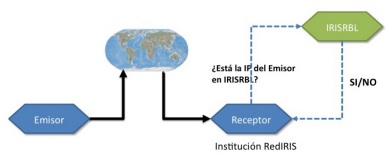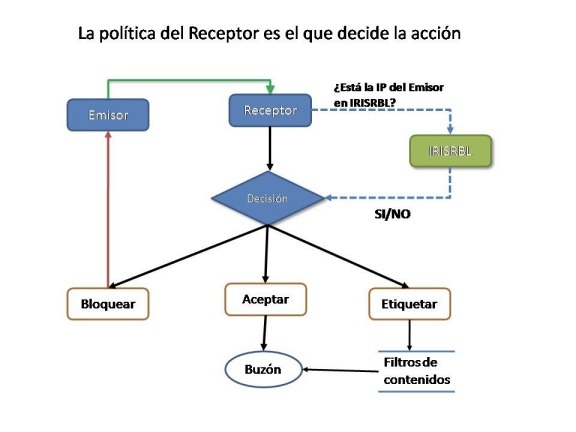Graphic description of IRISRBL Service
#subtitle Protect your mail servers from spam and false positive
How DNSbl works
IRISRBL is a DNSBL, a Blocking List; it is a database that is consulted in real time by e-mail servers to obtain an opinion of the reputation of the origin of an e-mail. The role of IRISRBL is to advise and provide an opinion to RedIRIS institutions on the reputation of specific IPs with respect to incoming electronic mail.

The policy of the receiver decides the action
Each institution and in general each domain that decides to implement antispam filters is defining a policy and actions for accepting incoming e-mail. The receiver unilaterally decides to use IRISBL as a blocking list and what it does with the incoming e-mail coming from an IP included in the IRISRBL list. IRISRBL only indicates if an IP is or is not included in the database.

Outstanding aspects:
- The receiver takes the decision to accept, label or reject e-mail messages depending on, among other factors, whether the IP of the sender is included in IRISRBL.
- The receiver looks up IRISRBL asking, "Is the IP of the sender in RBL?". IRISRBL automatically responds in real time to the query about the sender of the e-mail.
- RedIRIS does not intervene in the decision adopted by the receiver about what to do with the incoming e-mail from an IP included in IRISRBL.
- Instead of rejecting a message coming from an IP included in IRISRBL, the message can be labelled, which is very helpful for future analyses of the contents (spamassassin etc.).
- RedIRIS recommends that Institutions using IRISRBL block/reject the connection of IPs included in IRISRBL, instead of accepting them and then ending up storing them in the wastebasket. Rejecting and blocking an e-mail in an SMTP transaction means that the content of the message does not enter your domain, thus reducing the use of resources. We maintain a classical rule for electronic mail: If an e-mail cannot be delivered the sender must ALWAYS be made aware of this, and receive information about the causes of non-delivery.






